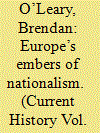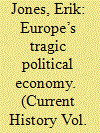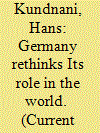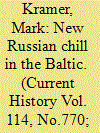| Srl | Item |
| 1 |
ID:
138180


|
|
|
|
|
| Summary/Abstract |
Despite sensationalizing media coverage that depicts immigration in terms of “human floods” and other “aquatic metaphors,” Luedtke argues that the European Union has steadily and quietly developed a common immigration policy closely linked to the union’s overarching project of political integration. He observes, “Europeanization has redefined what it means to be a foreigner and has made it easier to circulate freely inside the EU.” Even though national leaders continue to use the EU as a scapegoat for populist complaints about foreigners, Luedtke says most leaders recognize that the only way to effectively control immigration on a national level is to pool resources and sovereignty “to better protect the EU’s external borders.”
|
|
|
|
|
|
|
|
|
|
|
|
|
|
|
|
| 2 |
ID:
138182


|
|
|
|
|
| Summary/Abstract |
Though cosmopolitans, imperialists, theocrats, and jihadists wish it were otherwise, nationalism is the most potent principle of legitimacy in the modern world. The principle of national self-determination holds that nations should be freely and severally institutionally expressed, and ruled by their co-nationals in sovereign nation-states or in power-sharing arrangements with their peers in multinational states.
|
|
|
|
|
|
|
|
|
|
|
|
|
|
|
|
| 3 |
ID:
138179


|
|
|
|
|
| Summary/Abstract |
The World Bank issued a report in January warning that the European economy is slipping toward “secular stagnation,” a prolonged period of very low inflation and very low growth. Should it come to pass, this development will have a profound impact on all aspects of the region. It will lower opportunities for each successive generation while at the same time increasing pressure on European governments to curtail the welfare state. It will make it easy for populist political movements (and political entrepreneurs) to rally opposition to traditional political parties, governing elites, and national constitutional arrangements.
|
|
|
|
|
|
|
|
|
|
|
|
|
|
|
|
| 4 |
ID:
138184


|
|
|
|
|
| Summary/Abstract |
In January 2014, German President Joachim Gauck gave a remarkable speech at the Munich Security Conference in which he exhorted his compatriots to take greater responsibility for solving global problems. He criticized those who “use Germany’s guilt for its past as a shield for laziness or a desire to disengage from the world.” Most controversially in a country that aspires to be a Friedensmacht, or a “force for peace,” he said Germany should “not say ‘no’ on principle” to the use of military force. Polls carried out after the speech suggested that the German public was skeptical—particularly about the use of military force. Although several other leading politicians such as Foreign Minister Frank-Walter Steinmeier and Defense Minister Ursula von der Leyen expressed support for Gauck, Chancellor Angela Merkel remained conspicuously silent.
|
|
|
|
|
|
|
|
|
|
|
|
|
|
|
|
| 5 |
ID:
138181


|
|
|
|
|
| Summary/Abstract |
The greater the power, the more dangerous the abuse,” as Edmund Burke warned us, and sure enough the recentralization of political and economic power in Hungary under the post-2010 governments of Prime Minister Viktor Orbán has reversed many of the gains of the 1989 revolution. The Polish anticommunist dissident Adam Michnik, a great hero to the younger, more liberal Orbán, once argued that nationalism was the last stage of communism: Both could deploy demagogic language denouncing “the enemies of the people,” but the prioritization of national pride was a far more malleable proposition than the achievement of communism. What needs to be explained, therefore, is how, over 20 years after becoming the first country to cut a hole in the Iron Curtain (by allowing East Germans to cross the border into Austria), Hungary has been returned to authoritarianism.
|
|
|
|
|
|
|
|
|
|
|
|
|
|
|
|
| 6 |
ID:
138183


|
|
|
|
|
| Summary/Abstract |
In late February and March 2014, shortly after the violent overthrow of Ukrainian President Viktor Yanukovych, Russian President Vladimir Putin sent troops to occupy the Crimean Peninsula, which had long been part of Ukraine. Putin’s subsequent annexation of Crimea sparked a bitter confrontation with Western governments and stoked deep anxiety in Central and Eastern Europe about the potential for Russian military encroachments elsewhere. Nowhere has this anxiety been more acute than in Poland and the three Baltic countries—Lithuania, Latvia, and Estonia—where fears have steadily mounted as Russia has helped to fuel a civil war in eastern Ukraine while undertaking a series of military provocations in the Baltic region.
|
|
|
|
|
|
|
|
|
|
|
|
|
|
|
|